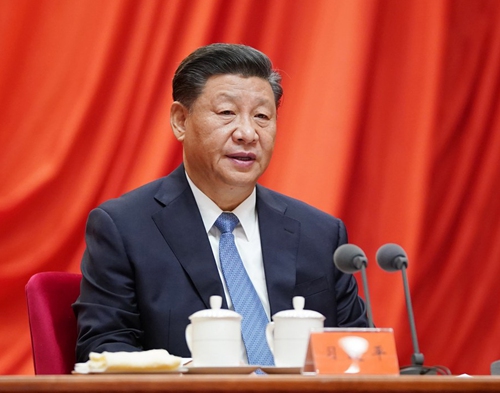
File photo: Xinhua
Xi Jinping, general secretary of the Communist Party of China (CPC) Central Committee, urged on Friday coordinated improvement to guarantee that officials do not have the audacity, opportunity, or desire to engage in corruption. He noted that the fight against corruption is a major political struggle that the Party cannot afford to lose and should never lose because it concerns the people.
Some observers noted that Xi's remarks have sent a clear signal to the CPC members of a guarantee that the Party "will not lose its original quality" when the century-old Party begins its journey to the next centennial. It serves as a reminder before the 20th National Congress of the CPC, when governments at all levels are expected to undergo a reshuffle, that upright officials endowed with honesty are welcome to serve.
Xi demanded a full victory in the anti-corruption campaign on Friday while addressing a group study session of the Political Bureau of the CPC Central Committee on improving anti-corruption capability.
He summarized valuable experiences from the fight, including zero-tolerance toward corruption, improved institutional constraints and the expansion of supervision over every CPC member and everyone in public office.
Xi described the anti-corruption fight as one that is extremely complex and arduous, saying that there is "no room" for compromise. He called on Party officials to be courageous to face problems squarely and muster the resolve to "wield the knife" and "cut off all tumors."
Acknowledging that the campaign has built into a crushing tide and is being consolidated, Xi however warned of the complexity and difficulty of the anti-corruption situation, urging more efforts to see the fight through.
Xi's remarks are intended to remind Party members of the importance of continuing the anti-corruption fight when the century-old Party is on its way to its second centennial, Zhang Xixian, a professor at the Party School of the CPC Central Committee in Beijing, told the Global Times on Sunday. He noted that doubling down on the anti-corruption fight at this juncture is also to ensure the Party "will not lose its original quality" in the coming one hundred years.
Su Wei, a professor at the Party School of the CPC Chongqing Municipal Committee, believes the speech that Xi delivered on Friday, coming months before the 20th National Congress of the CPC is to convene, whose exact date is not settled, is to remind governments at all levels to elevate those upright and honest officials as governments face a reshuffle around the Party congress.
The General Office of the CPC Central Committee issued a guideline aimed at regulating the business activities of officials' family members, including their spouses and children, the Xinhua News Agency reported on Sunday.
According to the Party document, officials should report their family members' business activities, and provide explanations of operations that violate regulation. Those who fail to report such activities or use their position to seek profits for family members' financial behaviors should be punished in accordance with the law.
The regulation is to guarantee the clean governance from its root, said the document, noting that the higher position the officials hold, the stricter scrutiny they and their family members have to face.
China has made shining achievements in fighting corruption since the 18th National Congress of the CPC held in 2012. The sweeping and strong efforts in this area have propelled many officials to turn themselves in. A report from the Xinhua News Agency said that 10,357 people gave themselves up to discipline inspection departments in 2019, and that number grew to 16,000 in 2020 and 38,000 in 2021.
Recently, the central government began to ramp up efforts in cracking down corruption in financial areas, as "fighting corruption in the financial sector becomes the main event as a country is more and more developed," Zhang said.
In May, the Central Commission for Discipline Inspection (CCDI) published an article that described what it termed the "revolving door" of corruption, which refers to the movement of individuals between positions of public office and jobs in the same sector in the private sector, in either direction.
The article said that the "revolving door" phenomenon is rampant in Western countries, yet it "exists in China to some extent."
The article gave the example of Guo Deqing, former chairman of the local committee of the Chinese People's Political Consultative Conference in city of Baiyin, Northwest China's Gansu. Whiel Guo was working as a supervisor for a private company after his retirement, he used his ties to government agencies to seek benefits for the company, reportedly receiving twice the level of bribes after he retired than when he was in government employment.
Many senior officials in small- or medium-sized financial institutes, which have become a hot spot for corruption, have been fired this year, media reported.
Media calculated that at least 20 senior officials from the financial sector were under investigation this year.
Corruption in the financial sector is the most difficult issue to tackle as it is deeply enmeshed with other areas, Su said. Addressing the issue in this sector is necessary as China is about to enlarge big projects including infrastructure and programs that aim to revitalize its numerous villages. "Sweeping corruption in the financial sector can guarantee the fairness of the market and justified allocation of investment," Su said.




